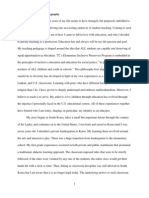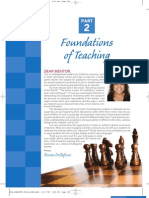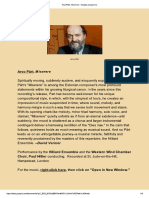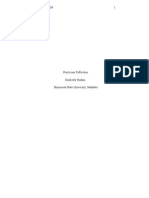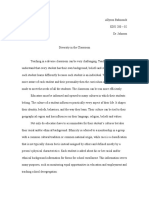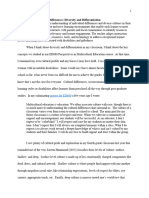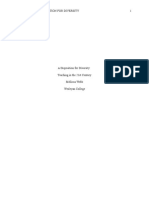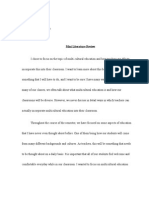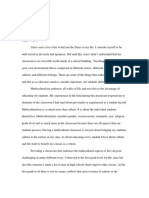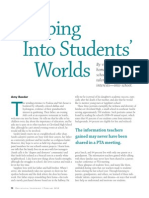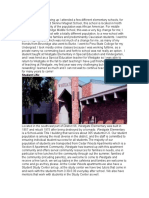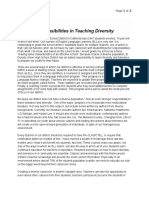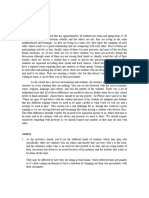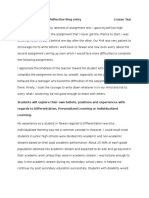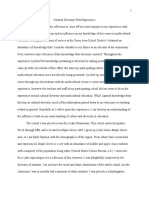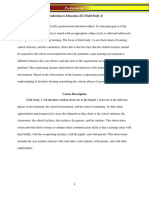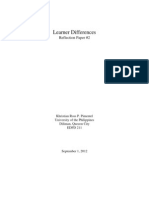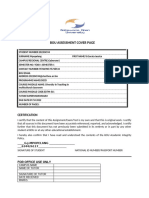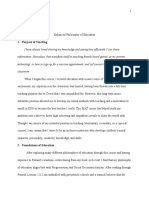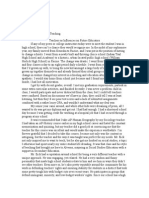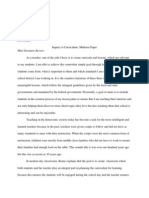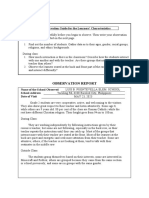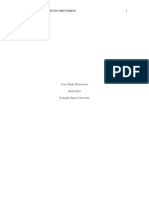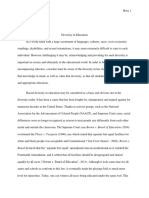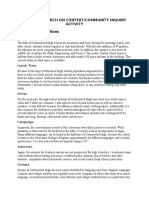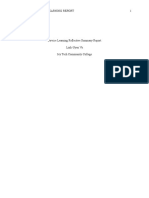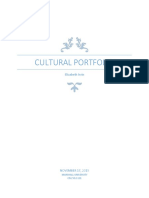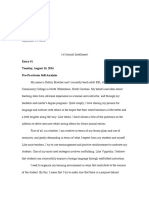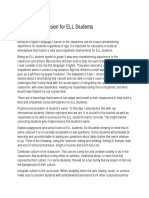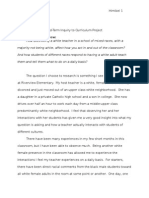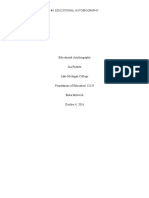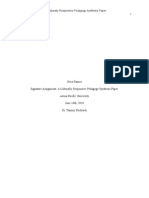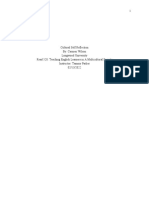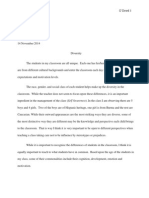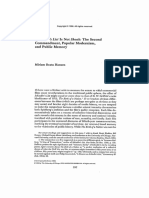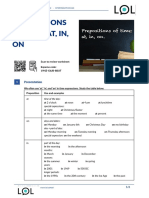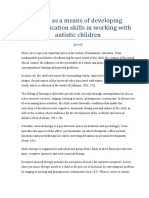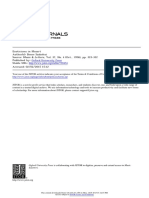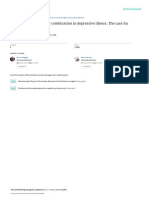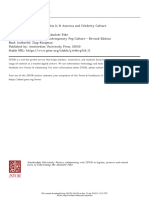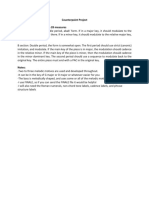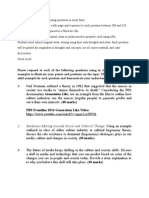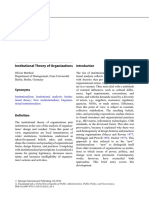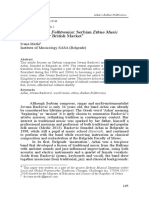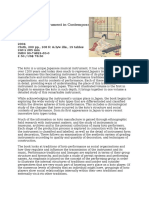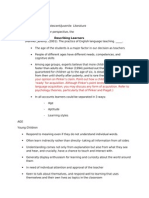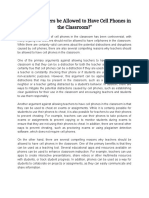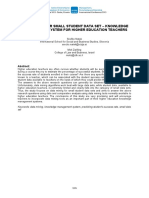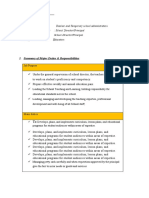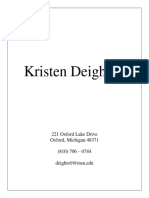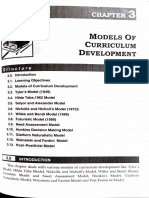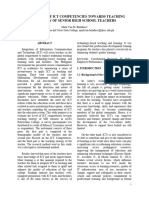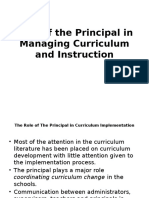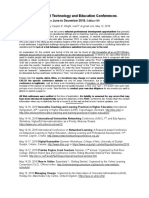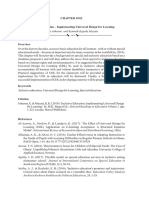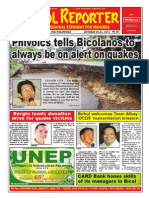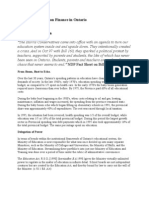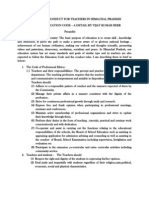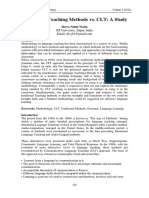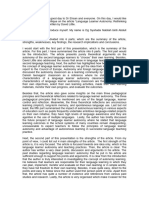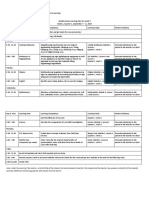2
2
Uploaded by
Jasmina MilojevicCopyright:
Available Formats
2
2
Uploaded by
Jasmina MilojevicCopyright
Available Formats
Share this document
Did you find this document useful?
Is this content inappropriate?
Copyright:
Available Formats
2
2
Uploaded by
Jasmina MilojevicCopyright:
Available Formats
Alice-Jane Webb
EDUC403 Assignment One
Cultural Diversity
EDUC403
UNE
Assignment One
Reflection Blogs
Due: Friday 2 April 2012
Weight: 40%
Alice-Jane Webb
Student Number: 220035510
Word Count: 2822 Words
1|P age
Alice-Jane Webb
EDUC403 Assignment One
Post One
I attended a very small elite private girls school, the students were predominantly Caucasian
and from upper class families. There was little diversity in my schooling days from
kindergarten to year ten, however in year eleven and twelve I experienced a little more
diversity with the students at the college I went to coming from different backgrounds,
cultures and linguistic differences.
I believe that my schooling experience has not provided much information in relation to
cultural diversity, as there were only a few students within my final two years that were
from different cultures, and the difference was very minimal at that, with no change
required by teachers or students to integrate them into the classroom, as they had already
been studying within Australia for a long time.
I look back on my educational experience and I was lucky in a way to have such small
focused classes, however I did miss out on learning about other people and cultures. In my
adult life I have travelled to many countries to experience other cultures, people and
religions, and I am looking at teaching in Thailand for a year or two once I have completed
my Masters in Education.
I did find that when out on my first teaching practicum, there were a few international
students and when working alongside my supervising teacher I assisted in helping those
students complete work tasks and I devised lesson plans for those students also with
assistance and knowledge of the teaching staff.
There are numerous issues that would need to be addressed as a teacher with a
considerable number of children from different cultural backgrounds. Obviously the issue of
language is an important one, it could be difficult for students with a non-English-speaking
background to understand the concepts being discussed, the pace that information is given
and to be able to respond to questions, essays or tasks. Another issue is the ability to
comment or discuss views and opinions critically. Different cultures have different
expectations and perceptions of the learning experience and in some international cultures
the students look to the teacher for their expert opinion rather than critique ideas and
views themselves. Another issues is participation within the classroom, this also interacts
2|P age
Alice-Jane Webb
EDUC403 Assignment One
with their ability to speak and understand English, and also the expectations that the
teacher is there to do the talking and convey the knowledge. One of the other many issues
that would need to be addresses is the interaction and group dynamics with other students.
Many students do not have any experience with working in groups as an approach to
learning.
I have found that teaching can be designed to cater for all students irrespective of their
cultural diversity. A good teacher does not exclude groups of students or individuals for any
reason; the unit material needs to be accessible to everyone no matter their learning,
language, cultural or educational background. Some strategies I would consider is to speak
with other staff and gather information about the customs and any cultural knowledge of
the students. I would make sure that all students understood the expectations of the class,
use clear language when addressing subject matter (all students would benefit from this)
and make the information accessible through different media such as handouts, on the
board, and/or in spoken form. I would also try to create a comfortable learning
environment and approach group learning in different ways initially allocating mixed groups
for non-stressful activities and then allowing students to select their own groups for other
activities until they are comfortable.
By living in a small rural town and attending an elite private girls school with class sizes of
10-15, my schooling life lacked cultural diversity. Most of theories and opinions of handling
this within a classroom come from the time that I spent on my teaching practicum and the
information I have gained so far within studying teaching. Teaching a multicultural student
base presents with issues and in turn changes to the teaching format that is just necessary
due to the present multicultural world. I believe that all students no matter of their learning
abilities, cultural backgrounds, race, gender, or other individual aspects deserve to have a
fulfilling and rewarding educational experience, and it is up to us teachers to provide that.
3|P age
Alice-Jane Webb
EDUC403 Assignment One
Post Two
The readings this week have shown me more of an understanding what it may be like to be
'different'. The existence of dominant socio-cultural power within our society has excluded
some ethnic groups from a sense of national belongingness. A negative representation of
these others is presented throughout our society from the school yard, the grocery shop,
and through the most powerful social institution, the media.
Joy Hopwood experienced many trials in achieving her goal of being on television and
performing, she was reprimanded for being Asian at her work, she was limited in her
auditions through stereotyping and not looking the part, but eventually became the first
regular Asian Play School presenter(Hopwood, 2008:275-279).
Although I could never completely understand what it would feel like to grow up in Australia
as an 'outcast' and have no sense of belonging, some of the experiences presented in the
readings sound a little familiar.
Hoa Pham mentioned that writing was a release for her when she was younger, and the
same holds true for me (Pham, 2008:261-263). I wasnt the target of racism, however I was
bullied very badly through school due to the fact I didnt have blond hair and blue eyes like
the other girls, I was on a scholarship at an expensive school but I had come from a middle
class family. I was surrounded by beautiful high class girls who had parents that were
doctors or lawyers, and homes that were beautifully decorated with more space than
necessary. My father was a hairdresser, a nobody to them. Just like Hoa Pham, I used to
draw myself with blond hair and blue eyes as I thought that was pretty, and I would feel
accepted among them (Pham, 2008:261-263). Cang Dao wrote I am not here for you to
make fun of me (Dao, 2001:15), and I felt the same way, I had a lonely feeling of exclusion
(Chong, 2008:239).
Joy Hopwood was pressured to achieve high results at school work just because she was
Chinese, when I moved from a private elite girls school to a public college in a very small
town; I was automatically expected to do much better that the other students due to the
schooling I had received, and when I was unable to perform in certain subjects, I was a
disappointment to my teachers more than the other students. I was also pressured to
4|P age
Alice-Jane Webb
EDUC403 Assignment One
achieve highly at the elite school due to the fact I was there on a scholarship, and I was
reminded every day, that I couldnt afford to go there, by both the teachers and students.
I understand that what I went through was not racism, but it was discrimination, painful,
isolating and damaging to my self-esteem. Once I moved from that school into a more
diverse setting, I was ridiculed less, able to make some friends and felt like I was included in
some areas. The lingering feelings that I was not accepted in society still linger, and the
want to be pretty is still in the back of my mind. I can only imagine what it would be like
having to feel the way I did at that school all the time.
5|P age
Alice-Jane Webb
EDUC403 Assignment One
Post Three
The readings this week opened my eyes to the forms of racial, linguistic, cultural and socioeconomic discrimination within the institution of schools throughout the world and the
lasting effects on the students relating to their identities, learning experiences, motivation
and their successes in life.
Delpits idea on the culture of power(Delpit, 1988:282) outlines numerous issues within the
institution of schools, and the fact that parents and teachers do not always agree on what
and how the students should be taught. The assumption I want the same thing for
everyone elses children as I want for mine plays a large part within the culture of power
(Delpit, 1988:282). Delpit questions who is responsible for the racial, linguistic, cultural and
socio-economic norms that assume the correct and productive method of teaching and
learning within schools (Delpit, 1988:282).
Fordham and Ogbu present a case study of a 20 year old black man recollecting his
schooling experience. He was accused of plagiarism at a young age due to the quality of his
school assignment by his white teacher, because she had assumption that the white
students were better (Fordham& Ogbu, 1986:176).
School teachers, teaching methods, curriculum, and school policies have a major impact on
the students, their abilities, their interaction with society and ultimately their outcome. The
multiple forms of racial difference create a learning environment for the student that
structures their beliefs on cultural and racial aspects in live. Cummins mentions the
importance of the students identity, and how teachers and the institution of schooling
assist in formulating and identity for the student by a historical and current pattern of
coerce relations of power (Cummins, 1997:426) . In some cases, such as Fordham et al
(Fordham& Ogbu, 1986:176) and Keef (Keef, 1992:45-61), the development of these
identities interfere with the academic achievement of the students.
Delpit states that to act as if power does not exist is to ensure that the power status quo
remains the same. (Delpit, 1988:292). I believe that there is a truth with this, however
there is always a darker side. For example, another case study by Fordham and Ogbu shows
a predominantly black school, Capital High, discourage against all forms of acting white
6|P age
Alice-Jane Webb
EDUC403 Assignment One
such as getting good grades, studying at the library, being on time, reading and writing
poetry, even working as a volunteer work to name a few (Fordham& Ogbu, 1986:185-186).
The students who want to achieve well in school and make something of themselves have to
learn how to cope with the burden of acting white which results in an unpleasant schooling
experience (Fordham& Ogbu, 1986:185-186).
Coming from a fairly sheltered schooling experience with minimal cultural and racial
differences, I cannot understand how a teacher could possibly treat a child as an other
because of their different culture, skin colour or linguistic heritage when they know how
much of an impact they could have on that child life. Teaching is not a profession where
you impart your own values, opinions and assumptions onto others, it is an open learning
environment where learning should be motivated, supported and developed. Reading these
articles made me feel sorry for the students involved, and upset that racial and cultural
discrimination still exists, especially within schools.
7|P age
Alice-Jane Webb
EDUC403 Assignment One
Post Four
The opening lines of Dalton have hit the nail on the head. Most White people, in my
experience, tend not to think of themselves in racial terms. They know that they are White,
of course, but mostly that translates into being not Black, not Asian-American, and not
Native American. (Dalton, 2005:15)
After reading many of the blog postings over the last few weeks, I noticed that many of the
students who show a lack of awareness on the powers of the dominant groups on the
minorities are those in the dominant group. This shows that race obliviousness is the
natural consequence of being in the driver's seat (Dalton, 2005:17)
Coming from the dominant group myself, I have not had to deal with racial or cultural
discrimination and I have not had to identify my whiteness in cultural or racial terms
before. Just because I was born with features that society values especially highly
(McIntosh, 2005:110), I receive numerous advantages and privileges in life. Due to the fact
that I havent had to work for these privileges, I have just been given them; they are
generally taken for granted. On the other hand the blogs from individuals in the minority
groups have shared their experiences with identifying themselves in racial and cultural
terms and their struggles to feel like they belong. McIntosh stated that whites are carefully
taught not to recognize white privilege, as males are taught not to recognize male privilege.
(McIntosh, 2005:109)
This makes me think of a Scrubs episode (television program, 2004);
Elliot: Look, I'm not gonna fight about whether in medicine it's harder being black or a
woman.
Turk: Black!
Elliot: Woman!
A black female doctor passes them.
Turk: Much prop, Dr. Rhodes.
8|P age
Alice-Jane Webb
EDUC403 Assignment One
I agree with Alice when she wrote I never realized how much sexism and racism there still is
on TV. I don't know if I'll ever be able to watch TV in the same way again (Tatum,
1994:466).
The 26 points that McIntosh noted on her White Privilege really made me think about what
it means for me, and how different my life would have been if some of those list items that I
take for granted were not available to me (McIntosh, 2005:110-111).
It is interesting to think about these privileges that are given to some of us at birth, for
example Wise mentions that the murderous actions of one white person do not cause
every other white person to be viewed in the same light, just as the incompetence or
criminality of a white person in a corporation does not result in other whites being viewed
with suspicion as probable incompetents or crooks (Wise, 2008:53).
According to Tatums stages of racial identity, I am beginning to see how much the lives of
people of colour have been affected by racism in our society (Tatum, 1994:464). I can see
how the stages outlined will assist me when dealing with a diverse classroom and the
possible resistance or denial within cultural and racial topics (Tatum, 1994:470).
During my educational experience there was a pressure to accept the stereotypes and
ignore racism (Tatum, 1994:467) as it was looked as a topic that wasnt necessary for a
predominantly Caucasian elite private girls school. Along with McIntosh my schooling gave
me no training in seeing myself as an oppressor, as an unfairly advantaged person, or as a
participant in a damaged culture (McIntosh, 2005:110).
The readings for this week have allowed me to gain a further understanding on the issues of
being different, defining ones identity with race, and the power and privilege that comes
with being in the dominant group. I can see now how as a teacher it is important to
identify ourselves in cultural and racial terms and to understand Whiteness in order to
teach towards diversity.
9|P age
Alice-Jane Webb
EDUC403 Assignment One
Post Five
This weeks readings have allowed me to use the information and knowledge learnt over the
last few weeks in relation to the issues of cultural diversity, difference, identity and race,
into a more practical mind set.
Ladson-Billings presents a culturally relevant pedagogy based on Patricia Hilliard, an
African American teacher who teaches her African American students with culturally
relevant practices (Ladson-Billings, 1995:52). Numerous examples of teaching styles and
practices are outlined in case studies showing a range of options to consider, with the main
style being positiveness, motivation and focusing on the achievements of the students.
Some of the comments from these teachers include, they are all successful at something
(Ladson-Billings, 1995:46), they are creatures of God and, accordingly, God doesnt make
junk!( Ladson-Billings, 1995:47) and I just know you can do that (Ladson-Billings,
1995:48).
Sarah Pearce starts questioning her teaching practices, originally looking at the children as
being the problem, but by documenting her findings and reflecting on the teaching lessons,
she learnt more about herself and how she could change. I had become aware that my
ethnic background, my white Englishness, shaped the way I saw the world in ways that I had
not previously considered, and that this lack of awareness was getting in the way of my
ability to teach. (Pearce, 2003:29).
The powers of the dominant groups on the minorities is more and more obvious to me
know after reading the examples of whiteness leading the way within education. For
example an Easter assembly was an overtly Christian performance for an overwhelmingly
Muslim audience at one school (Pearce, 2003:31).
However it is not only the teachers who need to change to more culturally diverse practices,
it is also the Education departments and governments who control the curricular knowledge
(Editors, 2001:206).standardized testing takes place in many schools to attain the students
academic achievements, which impacts on their futures, is linked to school reports, and has
a great impact on students dropping out from school or moving on to further education
(Editors, 2001:204).
10 | P a g e
Alice-Jane Webb
EDUC403 Assignment One
One teacher commented that the schools should move towards a more cultural relevant
practice and learning experience as an additional responsibility to straight academic
attainment, as most children all over the world are growing up in a multi-ethnic community
(Pearce, 2003:51).
11 | P a g e
Alice-Jane Webb
EDUC403 Assignment One
References
Chong, J. 2008, Anzac Day, in Growing up Asian in Australia, ed. A. Pung, Black Inc.,
Melbourne, pp. 239.
Cummins, J. 1997, Minority status and schooling in Canada, Anthropology & Education, vol. 28,
no. 3, pp. 411-430.
Dalton, H. 2005, Failing to see, in White privilege: Essential readings on the other side of
racism, 2nd edition, ed. P. S. Rothenberg, Worth Publishers, New York, pp. 15-18.
Dao, C. 2001, Race, in Rethinking our classrooms: Teaching for equity and justice [Vol. 2], eds.
B. Bigelow, B. Harvey, S. Karp, & L. Miller, Rethinking Schools Ltd. Milwaukee, pp. 15
Delpit, L. 1988, The silenced dialogue: Power and pedagogy in educating other peoples
children, Harvard Educational Review, vol. 58, no. 3, pp. 280-298. Available at ProQuest
database.
<http://proquest.umi.com.ezproxy.une.edu.au/pqdweb?did=1660174&sid=1&Fmt=6&clientId=
20804&RQT=309&VName=PQD>
Editors of Rethinking Schools. 2001'Failing Our Kids : Whats Wrong With the Testing Craze' In:
Rethinking our Classrooms, Volume 2 : Teaching for Equity and Justice / Edited by Bill Bigelow,
et al. Milwaukee, WI. : Rethinking Schools, 2001, pp. 204- 206
Fordham, S. & Ogbu, J. 1986, Black students school success: Coping with the burden of acting
white, Urban Review, vol. 18, no. 3, pp. 176-206.
Hopwood, J. 2008, Joy Hopwood, in Growing up Asian in Australia, ed. A. Pung, Black Inc.,
Melbourne, pp. 275-279
Keefe, K. 1992, Aboriginality in action: The cultural awareness camp, in From the centre to the
city: Aboriginal education, culture and power, Aboriginal Studies Press, Canberra, pp. 45-61.
Kohl, H. 2007, I wont learn from you!: Confronting student resistance, in Rethinking our
classrooms: Teaching for equality and justice, vol. 1, eds. W. Au, B. Bigelow & S. Karp,
Rethinking Schools Ltd. Milwaukee, pp. 165-166.
Ladson-Billings, G. 1995, But thats just what good teaching!: The case for culturally relevant
pedagogy, Theory into Practice, vol. 34, no. 3, pp. 159-165.
Mansouri, F. & Trembath, A. 2005, Multicultural education and racism: The case of ArabAustralian students in contemporary Australia, International Education Journal, vol. 6, no. 4,
pp. 516-529. Available at Google Scholar database.
<http://ehlt.flinders.edu.au/education/iej/articles/mainframe.htm>
McIntosh, P. 2005, White privilege: Unpacking the invisible knapsack, in White Privilege:
Essential Readings on the Other Side of Racism, 2nd edition, ed. P. S. Rothenberg, Worth
Publishers, New York, pp. 109-113.
Pearce, S. 2003, The teacher as the solution, You wouldnt understand: White teachers in
multiethnic classrooms. Trentham Books, Trent, UK, pp. 11-27.
Pham, H. 2008, Hoa Pham, in Growing up Asian in Australia, ed. A. Pung, Black Inc.,
Melbourne, pp. 261-263.
12 | P a g e
Alice-Jane Webb
EDUC403 Assignment One
Scrubs Season 3 My Tormented Mentor (television program) 03 February 2004, ABC Television
Tatum, B. D. 1994, Teaching white students about racism: The search for white allies and the
restoration of hope, Teachers College Record, vol. 95, no. 4, pp. 462-475.
Wise, T. 2008, Privilege, in White like me: Reflections on race from a privileged son, Soft Skull
Press, New York, pp. 17-60.
13 | P a g e
You might also like
- How To Teach Now - Five Keys To - William PowellDocument249 pagesHow To Teach Now - Five Keys To - William PowellppaminkhamdanNo ratings yet
- Jennifer Kang - Student Teaching AutobiographyDocument5 pagesJennifer Kang - Student Teaching Autobiographyapi-242980775No ratings yet
- Unit 1 Grade 6Document4 pagesUnit 1 Grade 6Thảo Lê PhươngNo ratings yet
- DLL-Template 2023Document14 pagesDLL-Template 2023Datu Donnavie100% (2)
- EDU 202 Portfolio Artifact # 1 - Philosophy of EducationDocument7 pagesEDU 202 Portfolio Artifact # 1 - Philosophy of Educationapi-549461032No ratings yet
- Observation Reflection PaperDocument6 pagesObservation Reflection Paperapi-29885826186% (7)
- 0136101356Document36 pages0136101356Richard Taylor PleiteNo ratings yet
- Arvo Pärt MiserereDocument8 pagesArvo Pärt MiserereJasmina MilojevicNo ratings yet
- PracticumreflectionpaperDocument5 pagesPracticumreflectionpaperapi-284114354No ratings yet
- Setting and ContextDocument4 pagesSetting and Contextapi-356954158No ratings yet
- Multiculturalism in Education Philosophy StatementDocument7 pagesMulticulturalism in Education Philosophy Statementapi-498269698No ratings yet
- Diversity in The ClassroomDocument2 pagesDiversity in The Classroomapi-315892044100% (1)
- Cultural Diversity Research Project and ReflectionDocument7 pagesCultural Diversity Research Project and Reflectionapi-340127786No ratings yet
- Diversity Paper (Edu 290)Document5 pagesDiversity Paper (Edu 290)api-242665012No ratings yet
- Document 3Document11 pagesDocument 3Romana Reguyal RamosNo ratings yet
- Diversity PaperDocument8 pagesDiversity Paperapi-300180291No ratings yet
- 12 Blog PostsDocument10 pages12 Blog Postsapi-520627593No ratings yet
- Diversity Differentiation Framing StatementDocument6 pagesDiversity Differentiation Framing Statementapi-722424133No ratings yet
- Diversity PaperDocument8 pagesDiversity Paperapi-283217268No ratings yet
- Edl 318 Paper 4-9-2015Document9 pagesEdl 318 Paper 4-9-2015api-285668067No ratings yet
- Embracing The Lobo WayDocument7 pagesEmbracing The Lobo Wayapi-508745952No ratings yet
- Philosophy of MulticultrualismDocument6 pagesPhilosophy of Multicultrualismapi-267249370No ratings yet
- Baeder (2010)Document6 pagesBaeder (2010)angelajohnson1983No ratings yet
- My Experience: Growing Up I Attended A Few Different Elementary Schools, ForDocument7 pagesMy Experience: Growing Up I Attended A Few Different Elementary Schools, Forapi-355194921No ratings yet
- 3 Reflect ResponsibiltiesinteachingdiversityDocument2 pages3 Reflect Responsibiltiesinteachingdiversityapi-315537808No ratings yet
- FS1 - Focus On Gender, Sped, IpDocument5 pagesFS1 - Focus On Gender, Sped, IpLaurence SapigaNo ratings yet
- Assignment 1 - Li JeanDocument3 pagesAssignment 1 - Li Jeanapi-315455516No ratings yet
- Cultural Diversity Practicum Reflection 1Document6 pagesCultural Diversity Practicum Reflection 1api-637154188No ratings yet
- PreliminariesDocument7 pagesPreliminariesaltarmariaNo ratings yet
- Autobiographic Essay: 1 Txgb6105 Language AcquisitionDocument7 pagesAutobiographic Essay: 1 Txgb6105 Language AcquisitionmegavinNo ratings yet
- Speech-Ub 40TH Pinning & Tribute To ParentsDocument4 pagesSpeech-Ub 40TH Pinning & Tribute To ParentsJunn MilarNo ratings yet
- Reflection Paper 2Document10 pagesReflection Paper 2Khristian RossNo ratings yet
- Gorata Mpopelang BvaruDocument10 pagesGorata Mpopelang BvaruseiphepioarabileNo ratings yet
- Philosophy of Education Paper-2Document6 pagesPhilosophy of Education Paper-2api-298464083No ratings yet
- Culturally Responsive School LeadershipDocument8 pagesCulturally Responsive School Leadershipapi-326382783No ratings yet
- Setting and ContextDocument6 pagesSetting and Contextapi-355200877No ratings yet
- Enhanced Philosphy of EducationDocument6 pagesEnhanced Philosphy of EducationJordan LutyNo ratings yet
- Giansante - Philosophy StatementDocument6 pagesGiansante - Philosophy Statementapi-266338559No ratings yet
- Diversity PaperDocument8 pagesDiversity Paperapi-295261080No ratings yet
- Effective Teaching InspirationDocument3 pagesEffective Teaching InspirationJulie KonenNo ratings yet
- What Is Culturally Responsive TeachingDocument10 pagesWhat Is Culturally Responsive TeachingKaviyasan Udayakumar100% (1)
- Inquiry To Curriculum Midterm PaperDocument8 pagesInquiry To Curriculum Midterm Paperapi-253999969No ratings yet
- Episode 3 and 4Document8 pagesEpisode 3 and 4Gene Lloyd NacorNo ratings yet
- DiversityDocument9 pagesDiversityapi-325737782No ratings yet
- Running Head: Case Study Discussion 1Document8 pagesRunning Head: Case Study Discussion 1api-423339155No ratings yet
- Diversity Paper IntascDocument8 pagesDiversity Paper Intascapi-295261080No ratings yet
- Part I: Research On Context/Community Inquiry Activity General ObservationsDocument5 pagesPart I: Research On Context/Community Inquiry Activity General Observationsapi-288668714No ratings yet
- Classroom Conversations: A Collection of Classics for Parents and TeachersFrom EverandClassroom Conversations: A Collection of Classics for Parents and TeachersNo ratings yet
- Service Learning Reflective Summary Report FinalDocument8 pagesService Learning Reflective Summary Report Finalapi-317127619No ratings yet
- Educ 201 Diversity ReflectionsDocument14 pagesEduc 201 Diversity Reflectionsapi-297507006No ratings yet
- Episode 3Document15 pagesEpisode 3Qyla Mhei DaquioagNo ratings yet
- Week 1 - PA Submission Edu 5711Document8 pagesWeek 1 - PA Submission Edu 5711annyjamesjonahNo ratings yet
- Goal2 1Document11 pagesGoal2 1api-369542825No ratings yet
- Student Teaching TwsDocument121 pagesStudent Teaching Twsapi-295563904No ratings yet
- Practicum Reflection JournalDocument42 pagesPracticum Reflection Journalapi-320798317No ratings yet
- Classroom CultureDocument3 pagesClassroom Cultureapi-257746864No ratings yet
- FS 1 Ep 3Document10 pagesFS 1 Ep 3Jon Watthapan MejaresNo ratings yet
- Mid-Term PaperDocument11 pagesMid-Term Paperapi-285642749No ratings yet
- Project 1 - Educational AutobiographyDocument5 pagesProject 1 - Educational Autobiographyapi-338129554No ratings yet
- Contextual FactorsDocument10 pagesContextual Factorsapi-247931703No ratings yet
- 503 Signature Assignment Final Draft 3Document15 pages503 Signature Assignment Final Draft 3api-542904320No ratings yet
- Annotated-Cultural 20self 20reflection 20summary 20 281 29Document5 pagesAnnotated-Cultural 20self 20reflection 20summary 20 281 29api-686117536No ratings yet
- Diversity Essay 1Document2 pagesDiversity Essay 1api-275158108No ratings yet
- Hansen Schindler's ListDocument28 pagesHansen Schindler's ListJasmina MilojevicNo ratings yet
- Prepositions of Time at in On American English StudentDocument3 pagesPrepositions of Time at in On American English StudentJasmina MilojevicNo ratings yet
- Music As A Means of Developing Communication Skills in Working With Autistic ChildrenDocument2 pagesMusic As A Means of Developing Communication Skills in Working With Autistic ChildrenJasmina MilojevicNo ratings yet
- Modern Emirati Literature Written by Woman WritersDocument14 pagesModern Emirati Literature Written by Woman WritersJasmina MilojevicNo ratings yet
- Proof Copy: Essays On Opera, 1750-1800Document38 pagesProof Copy: Essays On Opera, 1750-1800Jasmina MilojevicNo ratings yet
- Complete ScoreDocument11 pagesComplete ScoreJasmina MilojevicNo ratings yet
- Duloxetine-Mirtazapine Combination in Depressive IDocument4 pagesDuloxetine-Mirtazapine Combination in Depressive IJasmina MilojevicNo ratings yet
- America and Celebrity Culture!Document23 pagesAmerica and Celebrity Culture!Jasmina Milojevic50% (2)
- Counterpoint Project Binary Form: AB, Minimum 28 MeasuresDocument1 pageCounterpoint Project Binary Form: AB, Minimum 28 MeasuresJasmina MilojevicNo ratings yet
- Media Culture and SocieyDocument1 pageMedia Culture and SocieyJasmina MilojevicNo ratings yet
- BotswanaDocument6 pagesBotswanaJasmina Milojevic100% (1)
- 2017 Berthod BC Instit TheoryDocument5 pages2017 Berthod BC Instit TheoryJasmina MilojevicNo ratings yet
- Medieval/Rennaissance Era Timeline Tutorial 5 - Natasha WalshDocument2 pagesMedieval/Rennaissance Era Timeline Tutorial 5 - Natasha WalshJasmina MilojevicNo ratings yet
- Serbo Croatian Fol 00 BartDocument462 pagesSerbo Croatian Fol 00 BartJasmina Milojevic100% (3)
- Arhai S Balkan Folktronica Serbian EthnoDocument23 pagesArhai S Balkan Folktronica Serbian EthnoJasmina MilojevicNo ratings yet
- The Koto New Book Info 130904Document3 pagesThe Koto New Book Info 130904Jasmina MilojevicNo ratings yet
- Paused Example Campaign 8/15/11 0:00: Campaign ID Campaign Run Status Campaign Name Campaign Time StartDocument9 pagesPaused Example Campaign 8/15/11 0:00: Campaign ID Campaign Run Status Campaign Name Campaign Time StartJasmina MilojevicNo ratings yet
- Washington County Public Schools School-Wide Improvement Plan 2014-2015Document16 pagesWashington County Public Schools School-Wide Improvement Plan 2014-2015api-294900383No ratings yet
- Describing Learners - Age ComponentsDocument4 pagesDescribing Learners - Age ComponentsGercel Millare100% (1)
- JOHN NOEL GARCIA - BSED3-5 - SED 3205 - Predication of Course Content and ContextualizationDocument4 pagesJOHN NOEL GARCIA - BSED3-5 - SED 3205 - Predication of Course Content and ContextualizationJohn Patrick GarciaNo ratings yet
- Bi Y5 TS25 Unit 7 (LP125-142)Document19 pagesBi Y5 TS25 Unit 7 (LP125-142)Thurga AB KrishenanNo ratings yet
- Persuasive Essay On - Should Teachers Be Allowed To Have Cell Phones in The ClassroomDocument2 pagesPersuasive Essay On - Should Teachers Be Allowed To Have Cell Phones in The ClassroomTIRTHA DEB NATHNo ratings yet
- Data Mining For Small Student Data Set - Knowledge Management System For Higher Education TeachersDocument11 pagesData Mining For Small Student Data Set - Knowledge Management System For Higher Education TeachersRachel Torres AlegadoNo ratings yet
- SCIENCE DLL Week 1 Quarter 1Document6 pagesSCIENCE DLL Week 1 Quarter 1Glennen Jane Galagar SubaanNo ratings yet
- Vise Director Job DescriptionDocument4 pagesVise Director Job DescriptionAnteneh LemmaNo ratings yet
- Kdeighton ResumeDocument4 pagesKdeighton Resumeapi-356398248No ratings yet
- Giao An E 8 TD 2020-2021 Tron BoDocument296 pagesGiao An E 8 TD 2020-2021 Tron BoHuong ThanhNo ratings yet
- Curriculum ModelsDocument15 pagesCurriculum ModelsGoutam Kumar SinghNo ratings yet
- TeachingStrategy Buladaco - EditedDocument15 pagesTeachingStrategy Buladaco - EditedEmilene Panganiban Raniaga-MuñozNo ratings yet
- Role of Principal in Curriculum and InstructionDocument15 pagesRole of Principal in Curriculum and InstructionKabendera100% (2)
- Educational Technology & Education Conferences #39, June To December 2018, Clayton R. WrightDocument131 pagesEducational Technology & Education Conferences #39, June To December 2018, Clayton R. WrightcrwrNo ratings yet
- Muz A Tae Nsa Chapter 12Document6 pagesMuz A Tae Nsa Chapter 12Gboyega RichardNo ratings yet
- October 20-26, 2013Document8 pagesOctober 20-26, 2013Bikol ReporterNo ratings yet
- Stakeholders in Curriculum ImplementationDocument12 pagesStakeholders in Curriculum Implementationjoan galanto75% (4)
- Changes To Educational Finance in Ontario 2000Document21 pagesChanges To Educational Finance in Ontario 2000returnccNo ratings yet
- Bahay Pag-AsaDocument8 pagesBahay Pag-AsaVenna Grace OquindoNo ratings yet
- Code of Conduct For Teachers of Himachal PradeshDocument4 pagesCode of Conduct For Teachers of Himachal PradeshVIJAY KUMAR HEERNo ratings yet
- Traditional Teaching Methods vs. CLT A S PDFDocument7 pagesTraditional Teaching Methods vs. CLT A S PDFAldea SimonaNo ratings yet
- Gavora Slovakteachersself EfficacyDocument14 pagesGavora Slovakteachersself EfficacyMisa InafNo ratings yet
- Accomplishment Report NLCDocument7 pagesAccomplishment Report NLCAldrin Bonaobra100% (8)
- Critical AnalysisDocument2 pagesCritical AnalysisSyuhada NabilahNo ratings yet
- 180 TTM Arg RevistaDocument32 pages180 TTM Arg RevistaClaudia Patricia FernándezNo ratings yet
- Sample Weekly Home Learning Plan For Modular Distance LearningDocument12 pagesSample Weekly Home Learning Plan For Modular Distance LearningGina Dio NonanNo ratings yet
- Supporting Inclusion in Early Childhood SettingsDocument12 pagesSupporting Inclusion in Early Childhood SettingsDavidte Ten100% (2)
- RPH MT THN 2 Tajuk 1 (M1-M6) - EngDocument18 pagesRPH MT THN 2 Tajuk 1 (M1-M6) - EngJAMAL BIN ABDULLAHNo ratings yet

